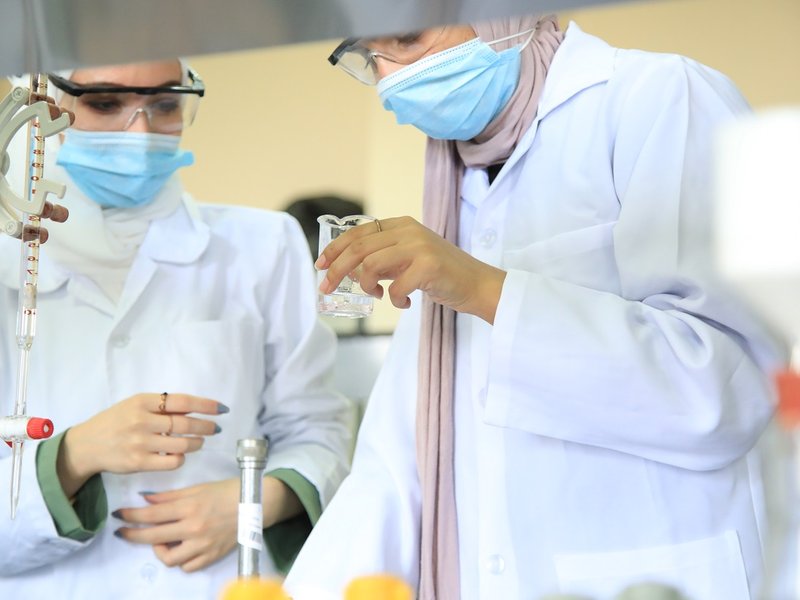- The department of Pharmacy was established as a college in 1994 to offer a bachelor degree of Pharmacy.
- The Master’s program in clinical Pharmacy was approved in 2003.
- The Doctor of Pharmacy degree was approved in 2007.
- In 2012, The Master’s program in Pharmaceutical Sciences was approved.
- In 2011, as a part of university policy to restructure colleges and departments, the college of Pharmacy was merged as a department in the Faculty of Medicine and Health Sciences.
- The department has several laboratories as part of the educational curriculum. These include Pharmacognosy, Phytochemistry, and Pharmaceutics Labs.
- Practical Pharmacy training supervised by the department faculty members is performed in cooperation with community pharmacies, local hospitals and the pharmaceutical industry.
- The department teaching faculty includes Pharmacists and Physicians from various departments of the faculty of Medicine and Health Sciences.
- The faculty members have the scientific and professional expertise in many Biomedical and Pharmaceutical Specialties. Curricular and extracurricular activities are held regularly to enhance knowledge, Talents, and abilities of our graduates to allow them to take leadership positions.
- Graduates are required to conduct scientific research projects under the supervision of faculty members.The department faculty members are involved in pharmaceutical research and have published their work in peer-reviewed journals.
The department of Pharmacy aspires to keep up with the scientific and professional advances and achieve excellence in Pharmacy education, pharmaceutical research, and community Service. The graduates of the department will have the following essential skills:
- Health and Pharmaceutical Care.
- Clinical Drug Therapy.
- Pharmaceutical Manufacturing and Marketing.
- Communication With other Pharmacists, Physicians, and Problem Solving.
- Modern Pharmacy Administration Education.
- Acquire the Essential Skills in Providing Drug and Poison Information.
- Practicing the Ethical and Legal Standards in Patient Care.
The Department Aims to Produce Graduates Capable of:
- Provision of high-quality Pharmacy care services.
- Making decisions and evaluating Drug information based on evidence-based principles.
- Technical skills to communicate with physicians and patients.
- Communicating with health care workers based on scientific principles.
- Managing human and material resources effectively.
- Life-long learning and building self-knowledge.
- Educating others with their practical and scientific knowledge.
- Being competitive leaders in the health care field to serve the patients and the local community.
- Being creative in the area of scientific research and the use of medicine in the health care system.
- Division of Clinical and Community Pharmacy.
- Division of Pharmaceutical Chemistry and Technology.
Practical Training Placements:
Students can train in public and private hospitals, hospital pharmacies, and pharmacies in different Palestinian governorates, as well as pharmaceutical factories.
The scheme followed to distribute students over training placements is as follows:
Two students get at most six-hour training on daily basis in one of the pharmacies, and this continues for 3 academic semesters for students of BA in Pharmacy, and 5 semesters of students of BA in Pharmacy Doctor, completing 1440 hours.
Two students get six-hour training a day over two months in a hospital pharmacy (compulsory for BA Pharmacy Doctor students, and elective for BA Pharmacy students).
Clinical training offers Pharmacy Doctor students (32 credit hours) all the means by which they can expand their knowledge and enhance their clinical skills. During the training, the student can enroll in the following specializations: internal medicine (8 weeks), general surgery and anesthesia (6 weeks), obstetrics and gynecology (4 weeks), pediatrics (6 weeks), oncology (4 weeks), and nephrology (4 weeks). Through training in these specialties, students have to evaluate all medical cases during the time they spend with the physician. They also have to evaluate the effectiveness of pharmacotherapy while being with the clinical pharmacist.
Clinical training offers MA Clinical Pharmacy students (12 credit hours) the means by which they can expand their knowledge and enhance their clinical skills. During the training, the student can enroll in the following specializations: internal medicine (6 weeks), general surgery (3 weeks), obstetrics and gynecology (3 weeks), pediatrics (6 weeks), oncology (3 weeks), and nephrology (3 weeks). Through these specialties, students have to evaluate all medical cases during the time they spend with the physician. They also have to evaluate the effectiveness of pharmacotherapy while being with the clinical pharmacist.
Pharmacy Doctor students have to register 16 training hours per semester, which equals 16 training weeks, while MA Clinical Pharmacy students have to register 6 training hours per semester, equaling 6 training weeks.
Successive Deans And Directors
2020-Now
-
2013 2020
Prof. Abdel Naser Zaid
-
2011 2013
Prof. Nidal Amin Jaradat
-
2010 2011
Prof. Ansam Feras Sawalha
-
2008 2010
Dr. Mohammad Musmar
-
2004 2008
Prof. Waleed Sweileh
-
2000 2004
Dr. Samar Musmar
-
1994 2000
Dr. Mohammed Hannoun




